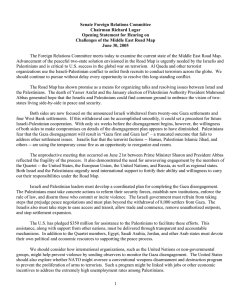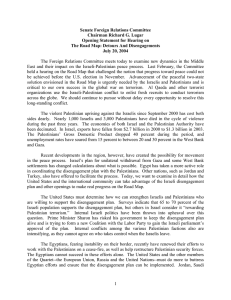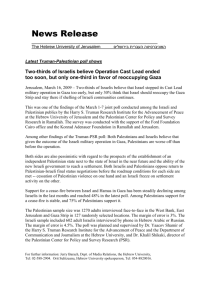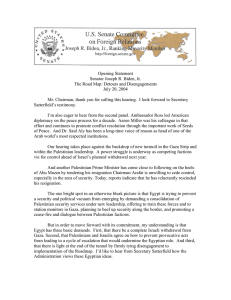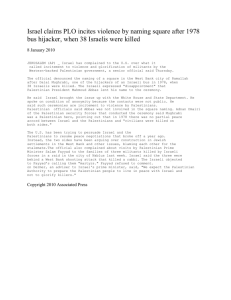Statement by Assistant Secretary of State for Near Eastern Affairs
advertisement
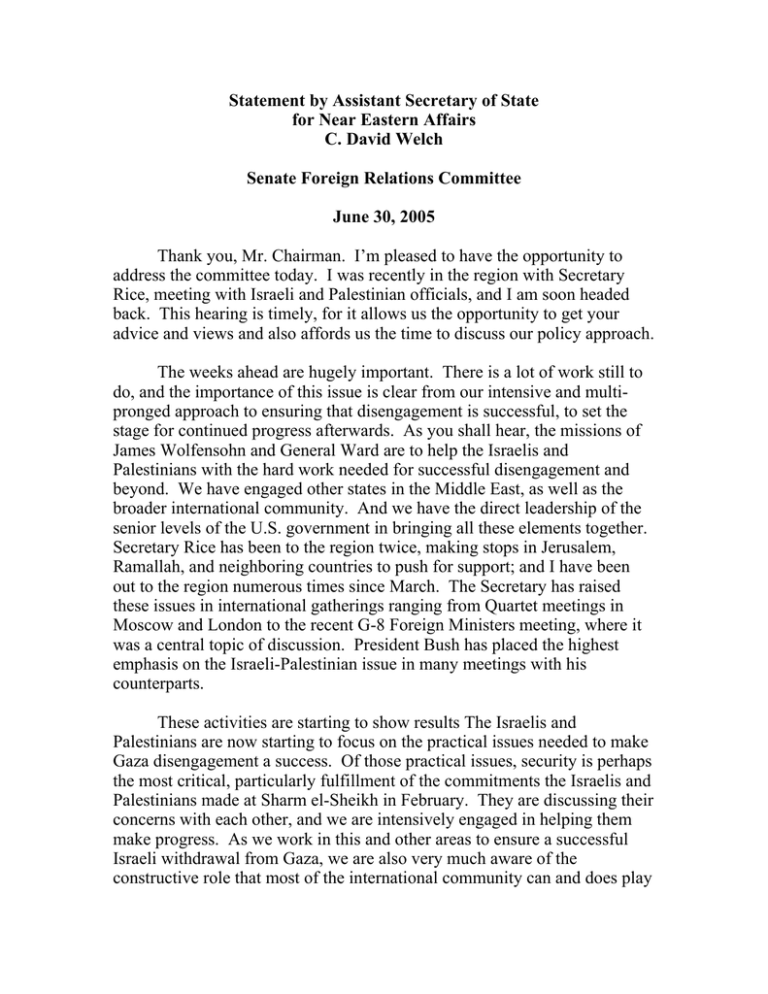
Statement by Assistant Secretary of State for Near Eastern Affairs C. David Welch Senate Foreign Relations Committee June 30, 2005 Thank you, Mr. Chairman. I’m pleased to have the opportunity to address the committee today. I was recently in the region with Secretary Rice, meeting with Israeli and Palestinian officials, and I am soon headed back. This hearing is timely, for it allows us the opportunity to get your advice and views and also affords us the time to discuss our policy approach. The weeks ahead are hugely important. There is a lot of work still to do, and the importance of this issue is clear from our intensive and multipronged approach to ensuring that disengagement is successful, to set the stage for continued progress afterwards. As you shall hear, the missions of James Wolfensohn and General Ward are to help the Israelis and Palestinians with the hard work needed for successful disengagement and beyond. We have engaged other states in the Middle East, as well as the broader international community. And we have the direct leadership of the senior levels of the U.S. government in bringing all these elements together. Secretary Rice has been to the region twice, making stops in Jerusalem, Ramallah, and neighboring countries to push for support; and I have been out to the region numerous times since March. The Secretary has raised these issues in international gatherings ranging from Quartet meetings in Moscow and London to the recent G-8 Foreign Ministers meeting, where it was a central topic of discussion. President Bush has placed the highest emphasis on the Israeli-Palestinian issue in many meetings with his counterparts. These activities are starting to show results The Israelis and Palestinians are now starting to focus on the practical issues needed to make Gaza disengagement a success. Of those practical issues, security is perhaps the most critical, particularly fulfillment of the commitments the Israelis and Palestinians made at Sharm el-Sheikh in February. They are discussing their concerns with each other, and we are intensively engaged in helping them make progress. As we work in this and other areas to ensure a successful Israeli withdrawal from Gaza, we are also very much aware of the constructive role that most of the international community can and does play in supporting efforts towards peace. Unfortunately, there are also states such as Syria, whose recidivist support of Palestinian extremist groups is an attempt to block the Israeli and Palestinian desire to achieve peace. Despite such unhelpful efforts, Israel, the Palestinians, the U.S., and the international community are committed to making disengagement a success, since a successful Israeli withdrawal from Gaza and an orderly Palestinian takeover there will help to re-energize the roadmap and bring us closer to realizing the President’s two-state vision. It has been three years since President Bush first put forth his vision of two democratic states – Israel and Palestine – living side by side in peace and security. Since then, a strong international consensus has developed behind his vision and behind the roadmap for peace designed to realize that vision, but we have to be honest and admit that roadmap implementation has lagged and neither side has fulfilled its obligations. The death of Arafat, the election of Mahmoud Abbas, who is committed to reform and has spoken out publicly against the use of violence, and the Israeli initiative to withdraw from Gaza and parts of the northern West Bank have together provided an opportunity to get the parties talking to each other again and, we hope, moving forward towards meeting their obligations under the roadmap. Disengagement is scheduled to begin in mid-August – some six weeks away. Time is short, and Israelis and Palestinians need to engage in genuine, effective coordination. During the Secretary's visit to Israel we were briefed on joint planning efforts currently underway between the Israelis and the Palestinians. The parties have begun to work coordination issues through a system of technical committees set up to deal with security and economic issues related to disengagement. Some progress has been made, but much work remains to be done to ensure that this complex operation is successful. Overall Palestinian performance on confronting violence has been far from satisfactory, and this is a real shortfall and area of concern. The main challenges to be addressed between now and mid-August can be divided into two broad categories – improving the security situation and creating the conditions for growth in the Palestinian economy. In the first category, our efforts are led by General William Ward, the U.S. Security Coordinator, who has been in Israel since March 9 to assist the Palestinians in reforming and restructuring their security services, and to lead and coordinate international assistance towards those efforts. I am pleased to be joined today by General Ward, who is ready to answer your questions about the status of Palestinian security force reorganization efforts. The past six months have seen some positive developments on the security front, but again, much remains to be done. That has been made particularly evident by the recent increase in violence in Gaza and the West Bank, including the firing of mortars and Qassam rockets into Israeli towns and settlements and the killings of Israeli civilians in the West Bank. The announcement by Secretary Rice when she was in Jerusalem on June 19 that Israel and the PA agree that the Israeli withdrawal must proceed peacefully and without violence may appear to be a basic point, but it is important that both parties have now gone on record as agreeing that peaceful disengagement is crucial for success of this entire process. President Abbas has taken some concrete steps towards security reform, including replacing some senior officials, passing a security pension law, decreeing the consolidation of the security forces under the authority of the Ministry of Interior and its Minister, Nasser Yussif, and cooperating fully with General Ward and his team. Abbas has made clear he will hold his security chiefs accountable for their performance in halting attacks on Israelis. General Ward is working intensively with the Palestinians to help them continue their progress on security reform, but we must be objective and acknowledge that complete reform is not going to happen overnight. The Palestinians still do not have a unified command structure, and their forces lack the discipline and trust to respond appropriately to their official chain of command. The consolidation of the security forces under Nasser Yussif is a start, and General Ward is continuing to address this problem with the Palestinians. The international community is also playing a large role in these security reform efforts, in close coordination with General Ward. The European Union’s civil policing program is training and equipping part of the Palestinian police force. Egypt is providing training for some Palestinian security forces. General Ward has assessed the equipment needs of the Palestinian security services, and a list of those needs has been provided to the international donor community to help guide the community’s real interest in assisting the Palestinians with their reform and capacity-building efforts in support of successful Gaza disengagement. That list identifies four broad areas of need: communications and control; mobility and transportation; logistics and medical; and force protection. We will continue to work urgently with the international community to identify the best way to channel aid for these areas into an effective program to support security reform. We are also encouraging Israel and the Palestinians to fulfill the commitments they made at Sharm el-Sheikh in February. They have already fulfilled some of those commitments: Israel has handed over nearly 900 Palestinian prisoners, and has transferred security responsibility for Tulkarm and Jericho to the Palestinian Authority. After Prime Minister Sharon’s meeting with President Abbas last week, Israel announced that it would transfer control of Bethlehem and Qalqilya to the Palestinians within two weeks, promised the release of some additional prisoners and made a commitment to improve the crossing situation to ease movement by Palestinians. An improved security environment is crucial for progress in our second category of pressing concern, that of Palestinian economic development. Here our efforts are led by James Wolfensohn, the Quartet Special Envoy for Disengagement. Mr. Wolfensohn will address this committee after my testimony, so I will not go into great detail on his mission; but I do want to say a few words about it. First of all, Mr. Wolfensohn has high credibility with both Israelis and Palestinians and met recently with the Quartet Principals and G-8 Foreign Ministers, who endorsed his work. Jim is focusing on Israeli-Palestinian coordination of the non-military aspects of the withdrawal, as well as on economic revitalization of the Palestinian economy. He has brought together a team drawn from both the U.S. government and from our Quartet counterparts, and his mission is clear evidence of how the international community can work together to contribute to the peace process. Mr. Wolfensohn has acted as a catalyst to improve coordination between Israel and the Palestinian Authority, and has engaged the donor community on the continued need to support the Palestinian economy. The key issues for Palestinian economic revival have been clearly identified. The immediate challenges include the disposition of settlement assets, improving the flow of goods and people, and the establishment of transportation links between the West Bank and Gaza. The Israelis and Palestinians made progress on the first two points during Secretary Rice’s visit two weeks ago, mutually agreeing that removal of existing settler homes in Gaza is the most sensible course of action; and Israel agreed to evaluate the way it manages crossings, in order to improve the flow of people and goods. However, we must remember that resolving these issues alone will not lead to an improved Palestinian economy if the Palestinian Authority does not maintain the pace of reform. Building transparent, accountable government institutions and creating an investorfriendly climate is critical to restoring growth. The task of returning the Palestinian economy to a sustainable footing will require the coordinated efforts of both the parties and the international community. Efforts by the Israelis and Palestinians alone are unlikely to be sufficient to revive the Palestinian economy. Four years of intifada-induced economic decline have left over two-thirds of Gazans in poverty. Declining revenue has left the Palestinian Authority with a $660 million shortfall in its budget this year, according to IMF estimates. At the March 1 London Meeting Supporting the Palestinian Authority, the international community underscored its readiness to play a vital role by providing financial and technical support to the Palestinians at this critical moment. In this regard, it is important to highlight the impact of our own efforts. The United States remains the single largest contributor of assistance to the Palestinian people. The $200 million in FY05 supplemental funding and our FY06 request for $150 million in assistance will be used to help improve the quality of life for Palestinians in both Gaza and in the West Bank. During President Abbas' May 26 visit to the White House, President Bush announced that $50 million would be used in direct assistance to the Palestinian authority for new housing and infrastructure projects in Gaza. This assistance will be drawn from remaining unobligated FY 2005 funds. The challenging missions of Mr. Wolfensohn and General Ward clearly require close consultation with Israeli and Palestinian officials. In order to facilitate these consultations in the short time left before Gaza disengagement begins, we have decided to amend our travel ban on official U.S. travel to Gaza. The travel ban remains in place, but we are now allowing limited travel to Gaza by only Mr. Wolfensohn and General Ward – and others needed for direct support of their missions – on a case by case basis, in recognition of the imperative need to assist the Gaza disengagement process. I have mentioned a number of areas in which the international community can be or has been helpful, including providing economic assistance and helping with security training and reform. It is important to note that amongst the members of the international community, the Arab states have a key role to play in promoting peace. They have a special responsibility to provide economic assistance to the Palestinians and to press for continued reform of the Palestinian Authority, but they can also move the process forward by resuming contacts with Israel, re-opening trade and representative offices, and abandoning the Arab League boycott. Above all, Israel's neighbors in the region have an obligation to clearly oppose those who would support terrorism or work against the peace process. We will continue to work over the coming months to encourage our friends and partners in the region to help create a positive environment for peace. Gaza disengagement holds out the possibility of re-energizing the roadmap, which is still the only plan on the table. We believe that the roadmap and existing mechanisms, including the Quartet, the Wolfensohn mission, the Ward mission, and of course, our ambassador in Tel Aviv and our Consul General in Jerusalem are the best avenues right now for moving the parties forward on disengagement and on their roadmap commitments. Both Israel and the Palestinians continue to have obligations under the roadmap: Palestinians must confront violence and dismantle the terrorist infrastructure; Israel must stop settlement expansion and dismantle unauthorized outposts. We will continue to work with both parties, through our existing channels, to encourage them to meet their roadmap commitments and achieve a peaceful, orderly Israeli withdrawal from Gaza and parts of the northern West Bank. Successful Israeli disengagement will – we hope – trigger progress along the roadmap and move us closer to our ultimate goal of the two-state solution to the Israeli-Palestinian conflict. Thank you, I’ll be happy to take your questions.

